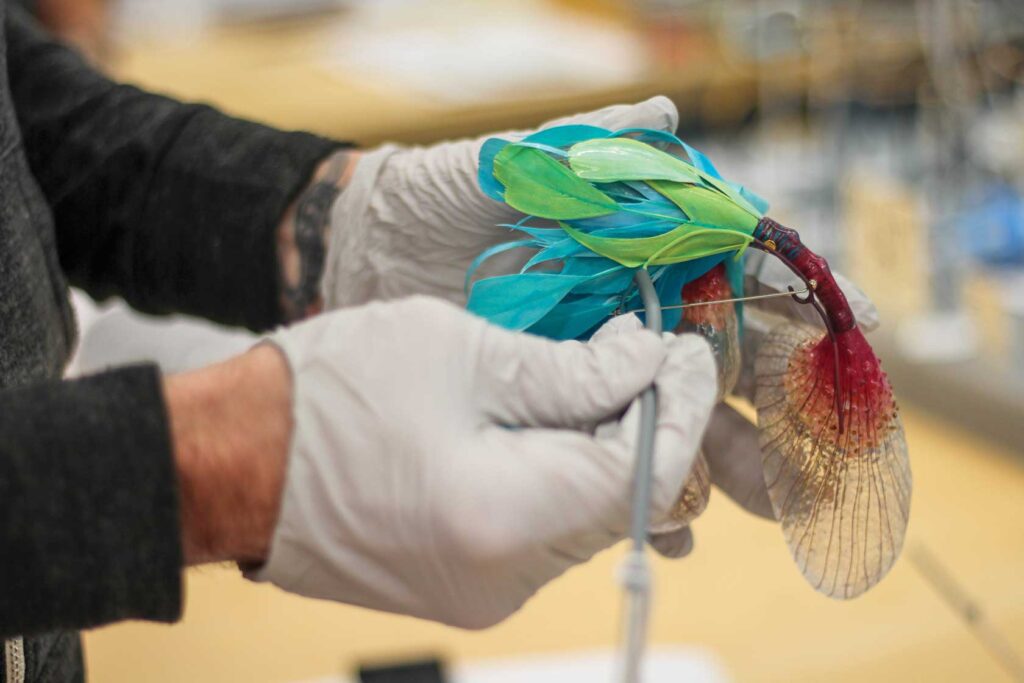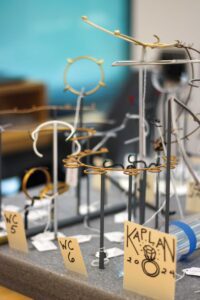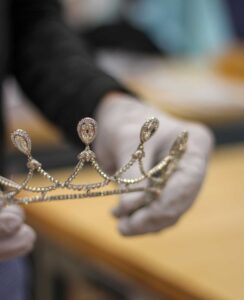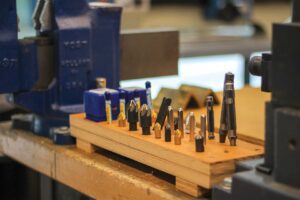Mountmakers: The under-the-radar artists holding museum exhibits together

Banner Arts & Culture Sponsored by Cruz Companies
In the newly renovated jewelry gallery at the Museum of Fine Arts, Boston, delicate tiaras float in glass cases next to ornate brooches and avant-garde necklaces. Viewers are drawn to the shiny metals and bright colors, but underneath each piece, an intricate structure of metal, wood, paint and plexiglass keeps those precious artworks posed in a seemingly effortless manner. Those structures are mounts — made by mountmakers, a small but crucial group of museum workers that, quite literally, hold exhibitions together.
“The irony of our job is that if you don’t notice it, we did good job,” says Kim McParland, one of the mountmakers at the Museum of Fine Arts.

Mounts are intricate structures of metal, wood, paint and plexiglass that keep precious artworks posed in a seemingly
effortless manner. PHOTO: CELINA COLBY
Mounts are all over the museum, stabilizing vases, holding plates up against a wall, displaying delicate earrings and ancient woodcarvings. Mountmakers, often lumped under the catchall name “preparator,” are the skilled artisans making sure the artworks can physically be displayed. Without them, there is no exhibition.
The job requires a skill set at the nexus of artistry and engineering. The mounts at this museum are designed to not be seen, which can mean painting them the same exact pattern as the object it holds, but they also need to support the artwork structurally and align with conservation standards. This requires welding, woodwork, painting, plaster-casting and much more.
The breadth of knowledge needed for the job is particularly astounding, because mountmaking isn’t a direct and viable career path the way conservation or curating are.
“There’s no formal training program,” says McParland. “It’s all a variety of different backgrounds. A lot of people will come in with skills; they’ll be jewelry-makers or artists themselves, but a lot of learning is done on the job.”
Brett Angell, senior exhibitions preparator of objects at the MFA, essentially the head mountmaker, is also an artist. In fact, the museum has a number of his collage works in its collection. McParland also trained in sculpture, but both fell into the mountmaker role through odd museum jobs. Though it’s a small club, there are other mountmakers out there. In fact, they’re all assembling at the MFA in September for the International Mountmakers Forum.
But not all mountmaker jobs are created equal. The MFA has the luxury and resources to be very specialized; Angell and McParland make and install mounts exclusively. For freelancers and preparators at smaller museums, that’s just one job among a slew of others.
“The jobs are really different. I’ve worked at places where not only do you do this kind of stuff, but you demo, you hang sheetrock, you paint and stuff like that,” says Angell.

A Museum of Fine Arts mountmaker delicately handles a tiara destined for the “Beyond Brilliance” exhibition. PHOTO: CELINA COLBY
Sue Aygarn-Kowalski is a jewelry and sculpture artist, the preparator at the Art Complex Museum in Duxbury, and a freelance installer and mountmaker. She recently worked on the “Beau McCall: Buttons On!” exhibition at the Fuller Craft Museum, where she handled the full installation of the artworks as well as the mounts. Mountmaking comes naturally to Kowalski, who is a metalsmith known for her beautiful art hammers. There are several of those in the MFA’s collection as well.
“I liked being behind the scenes. I liked the fact that I could get paid to work in the art world,” says Kowalski. “I had started out part-time at a museum doing installation, and it was enough work that it grew into a career.” Kowalski began making mounts out of necessity in her installation work — it was the best way to display things in a unique way — and it’s now a regular part of her process.
Every day as a mountmaker is different. Angell and McParland made around 130 unique mounts for the “Beyond Brilliance: Jewelry Highlights from the Collection” exhibition, which opens May 18. For “Dress Up,” a fashion exhibit that opened in April, they faced challenges like casting plaster arms to display bracelets and attaching earrings to mannequins with no earlobes. When working on the Beau McCall show, Kowalski welded special hangers and brackets of steel to display unusually shaped half-jackets. Creativity and a DIY spirit are essential to the job.
Years of working on the back end of museum exhibitions have impacted how these mountmakers see the art world.
“That’s our downfall,” says Angell. “Whenever we go to museums, we’re always peeking around trying to see how they did it, rather than looking at the show.”
For visitors, it’s worth peeking around in “Beyond Brilliance” and “Beau McCall: Buttons On!” and taking a moment to appreciate the work of mountmakers as well.








